Why artists shouldn’t stay in their lane featuring Lin-Manuel Miranda, Luis Miranda Jr. and Elaine Welteroth
Transcript
[Why artists shouldn’t stay in their lane. Lin-Manuel Miranda, composer, lyricist, and actor. Creator, “Hamilton”, and “In the Heights”. A Puerto Rican man with short black hair, a goatee, and wearing a blue-gray sweater with a collar and the sleeves rolled up. Luis Miranda Jr., founding partner, The Mirram Group. A Puerto Rican man with salt and pepper hair and goatee, wearing a gray suit with a light diamond pattern and a white open collared shirt. Elaine Welteroth, Author, “More Than Enough”. A woman with her hair pulled back, wearing a white blazer and pants over a tan shirt.]
ANNOUNCER: Please welcome Lin-Manuel Miranda, Luis Miranda Jr., and Elaine Welteroth.
[applause]
ELAINE WELTEROTH: Hi, you guys. I’m so excited to be here with you, and I know that we are here to talk about, uh, you know, why artists should not stay in their lane.
LIN-MANUEL MIRANDA: Oh, I would love to stay in my lane.
ELAINE WELTEROTH: Actually, I want to applaud you for not staying in your lane.
LIN-MANUEL MIRANDA: Right.
[applause]
ELAINE WELTEROTH: I want to get your perspective as an artist on how you define activism for yourself, and do you consider yourself an activist?
LIN-MANUEL MIRANDA: Well, I think that all art is political, and if it’s—and if you think it’s not, you’re lying to yourself, because our art exists in the world, and the world is inherently political.
ELAINE WELTEROTH: Absolutely. And, it’s very clear from just studying your history, your personal history, that your sense of duty in terms of activism is really—it goes right down to your core, to your DNA. And it starts with this man here—your father.
LIN-MANUEL MIRANDA: Yes.
ELAINE WELTEROTH: I want you to confirm or deny that, actually, um, you and your wife met at a protest.
LUIS MIRANDA JR.: Actually, our first date.
ELAINE WELTEROTH: Oh, your first date was a—
[laughter]
LIN-MANUEL MIRANDA: So romantic.
ELAINE WELTEROTH: So romantic.
[laughter]
ELAINE WELTEROTH: So romantic.
LIN-MANUEL MIRANDA: I was never going to stay in my lane with a first date like that. It’s written in the stars.
[laughter]
ELAINE WELTEROTH: Yeah. And so, Luis, I mean, talk about how, um, the success of “Hamilton” has really changed the scope of the work that you’re now able to do. I mean, you’re new to five- and six-, seven-figure, you know, deals and being able to really increase your philanthropic efforts.
LUIS MIRANDA JR.: In fact, you know, put aside the financial, uh, reward. We always gave as much as our financial situation allowed us to give. And we sort of grew up with the belief that you must give until it hurts.
ELAINE WELTEROTH: Mmm.
LUIS MIRANDA JR.: If it doesn’t hurt, if you’re not, not doing something else, then you’re not giving enough.
ELAINE WELTEROTH: Mmm.
LUIS MIRANDA JR.: And that was always our philosophy, that you give as much as you possibly can, and deprive yourself of clothes and stuff that you really don’t necessarily need. But add to that now, uh, that because Lin-Manuel has such a huge stage and such a big megaphone, it sort of allow us, uh, to speak out on things that, before, our neighbors and our bodega owner heard about—now many, many more people are hearing about.
ELAINE WELTEROTH: I think that’s an important point to make, which is that, you know, Lin, your work in itself is a form of activism—the way that you prioritize representation and inclusion, um, the way that you use the funds, the places that you show up. And so I want to talk about you showing up in Puerto Rico—
LIN-MANUEL MIRANDA: Yeah.
ELAINE WELTEROTH: following the hurricane. Um, talk about what your highest goal was for being there—and then, ultimately, what was the impact of bringing the show there.
LIN-MANUEL MIRANDA: Sure. It was several stages, and Hurricane Maria upended the life of every Puerto Rican on the island, in the diaspora, everywhere—because we’re all connected to that island. And the first—I would say the first few months were just critical relief efforts. We worked with Hispanic Federation. We raised as much as we could for making sure that we had boots on the ground in every town. We didn’t work with central government. We worked with mayors. We called the mayors and said, “What do your people in your community need?” Because we wanted to bypass the bureaucracy we were already seeing on the news. So, that was the first stage, and I wrote a song called “Almost Like Praying,” where I maxed out the Latin Rolodex and got everyone to record to raise money for that critical effort. And then “Hamilton” was sort of the second phase of that, which was, we brought, um, we inaugurated a new national tour of “Hamilton” in Puerto Rico with all the funds going to arts, artists, and arts organizations on the island. And if anyone saw any of the images from this summer, artists led the charge on that. Artists led those protests. And so our goal with “Hamilton” was, I’m not going to be the one who tells the story of Maria. I was here on the outside. It is the artists who survived that and survived the subsequent months without electricity and living on generators and living in deprivation that are going to eventually tell that story, uh, in a way that really—again, that magic bullet of empathy that makes us understand. And so we, we—give me the numbers on what we—we raised $15 million—
LUIS MIRANDA JR.: For the arts.
LIN-MANUEL MIRANDA: Yeah, through that production of “Hamilton.” I relearned—
LUIS MIRANDA JR.: And around 45 million with the Hispanic Federation, for the overall effort.
LIN-MANUEL MIRANDA: Yeah, and then that’s in multiyear grants to museums, arts organizations, in every discipline—in fine arts, in film, in theater—um, and so that we … you know, because philanthropy doesn’t often prioritize arts, especially when such critical needs are still not being met. But we wanted to sort of fulfill that lane.
LUIS MIRANDA JR.: The other thing that we did was the civic engagement of nonprofit organizations.
ELAINE WELTEROTH: Mm-hmm.
LUIS MIRANDA JR.: It’s a fragile infrastructure of nonprofits in Puerto Rico. And right after the initial relief effort, we went to identify where are those organizations, how can we give multiyear grants so that they can plan for the long term in terms of building a new, resilient Puerto Rico.
ELAINE WELTEROTH: Mm-hmm.
LUIS MIRANDA JR.: And we have now been doing that since September 20, two years ago.
ELAINE WELTEROTH: It’s incredible. It’s incredible, the impact that you’ve had, and in a short amount of time. When I think about activists, um, you know, I think it’s important that we humanize activists, because ultimately activists are people who are brave enough to ask the question, how can I help—
LIN-MANUEL MIRANDA: Yes.
ELAINE WELTEROTH: and courageous enough to attempt to try to find a solution with the best, uh, resources that they have at their disposal. And, um, so—
LIN-MANUEL MIRANDA: Yeah, and I’d add another caveat, which is that I believe the impulses for activism and philanthropy, and your artistic impulses, come from the same place—
ELAINE WELTEROTH: Absolutely … absolutely.
LIN-MANUEL MIRANDA: in that it’s the thing that keeps you up at night, the thing you are thinking about in the shower, that thing you read or that nugget you heard about, and you’re like, I can’t leave that be. That, to me, is what it feels like when I need to write a song, or I need to write a piece of music, or there’s a story that won’t leave me alone. You can’t sleep it off, and you can’t eat ice cream till it goes away. Listen to that impulse, because you—it will—it’s just like honoring an artistic impulse. You will feel better.
ELAINE WELTEROTH: Absolutely. Yeah, and you’ve heeded the call—
LIN-MANUEL MIRANDA: Yeah.
ELAINE WELTEROTH: artistically and in terms of your activism. But I think a lot of people, um, are so afraid of getting it wrong that they miss the opportunity to even begin.
LIN-MANUEL MIRANDA: Yeah.
ELAINE WELTEROTH: And so I’m curious, from the time that you’ve spent in Puerto Rico, um, and beyond, what have you—what mistakes have you made that you’ve learned from, that were critical mistakes you needed to make in order to learn critical lessons?
LUIS MIRANDA JR.: Uh, I think … the first one is just, jump into a situation without having the road map.
ELAINE WELTEROTH: Mmm.
LIN-MANUEL MIRANDA: Yeah.
LUIS MIRANDA JR.: And that’s what keeps me up at night as we are funding 140 groups in Puerto Rico within a year. You should not do that.
[laughter]
LUIS MIRANDA JR.: It’s insane to do that! But there were so many groups that were doing such great work that then you say, I chance it.
ELAINE WELTEROTH: Mmm.
LUIS MIRANDA JR.: I don’t have the road map. I’m going to make some of it as I go along and we’ll figure it out. I always remember, uh, David Axelrod who ran Obama’s campaign, and we did campaigns together in New York. I saw him when he was in the beginning of the Obama campaign, and he said, “It feels like I’m building a plane as we’re flying.” And that sort of stays in my head, and every time we’re going to stop ourselves from doing something that you ought not to do, David Axelrod comes into my head, saying, “Just build the plane as you’re flying.”
ELAINE WELTEROTH: Mmm.
LUIS MIRANDA JR.: So, it’s always—you’re always gambling that part.
ELAINE WELTEROTH: Mmm.
LIN-MANUEL MIRANDA: Yep.
ELAINE WELTEROTH: I’m inspired. How about you? Thank you all so much for joining us, and thank you.
[applause]
LIN-MANUEL MIRANDA: Thank you.
ELAINE WELTEROTH: Thank you for all of the work that you do—so incredible.
[applause]
[New gospel of wealth. What does #GenerosityToJustice look like to you? Ford Foundation dot org forward slash new gospel.]
Accessibility Statement
- All videos produced by the Ford Foundation since 2020 include captions and downloadable transcripts. For videos where visuals require additional understanding, we offer audio-described versions.
- We are continuing to make videos produced prior to 2020 accessible.
- Videos from third-party sources (those not produced by the Ford Foundation) may not have captions, accessible transcripts, or audio descriptions.
- To improve accessibility beyond our site, we’ve created a free video accessibility WordPress plug-in.
Composer, lyricist, and actor Lin-Manuel Miranda and his father, Luis A. Miranda Jr., of the MirRam Group discuss how artists can use their work and voice for justice. Moderated by Elaine Welteroth.
“I believe the impulses for activism and philanthropy and your artistic impulses come from the same place … Listen to that impulse.”
– Lin-Manuel Miranda
Learn more about New Gospel of Wealth
Other videos in this series
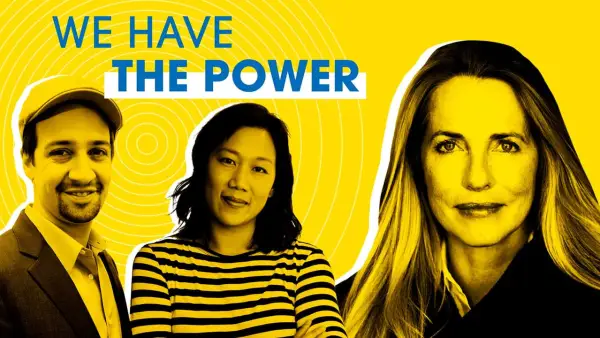
Let’s rethink giving
How can we reimagine philanthropy so that we create a future where there is justice and dignity for all? What are the root causes of the issues and how do we encourage the participation of many and not just a few?
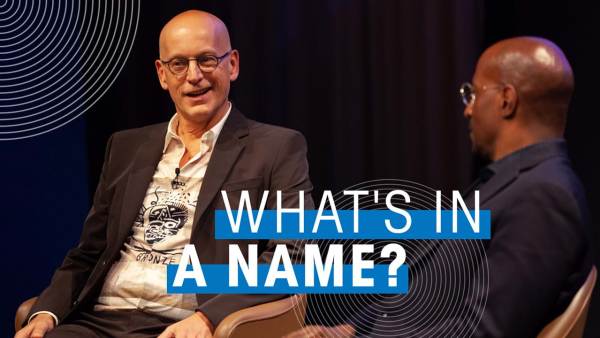
The power of a name featuring Jon Stryker and Van Jones
As a philanthropist, Jon Stryker, president of the Arcus Foundation, believes the act of naming gives power and influence to the work that is supported through his gifts. His philanthropy supports those on the frontlines of justice, providing resources and power to those who need it most.
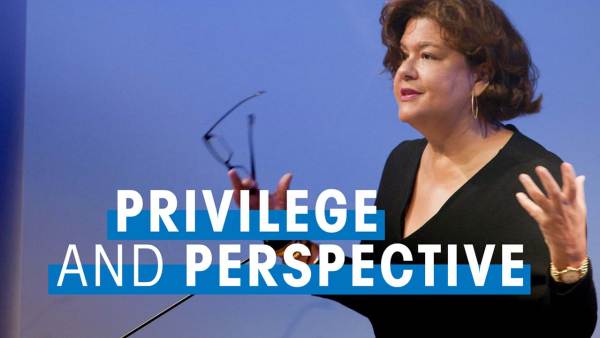
The privilege of perspective featuring Elizabeth Alexander
Elizabeth Alexander, president of the Andrew W. Mellon Foundation, on art, activism, and acknowledging adversity.
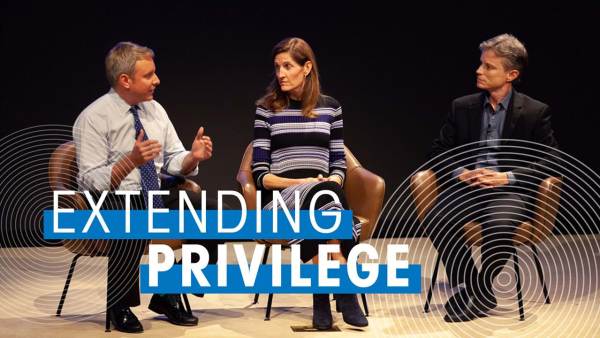
Extending privilege featuring Valerie Rockefeller and Henry Ford III
Henry Ford III, trustee of the Ford Foundation, and Valerie Rockefeller, chair of the Rockefeller Brothers Fund, discuss transforming philanthropy for the 21st century. The families have seen the value of impact investing and believe in partnerships to increase the difference that can be made.
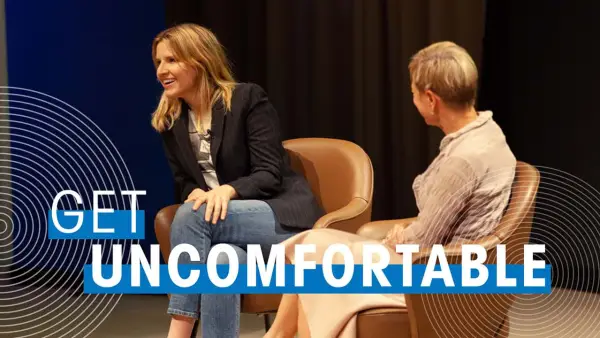
Getting proximate featuring Tara Westover and Hilary Pennington
Tara Westover, author of “Educated,” sees a disconnect between the rural and urban parts of the United States. She believes philanthropists need to be more proximate to the issues they care about, and that spending time with people who aren’t like you is key to disrupting inequality.
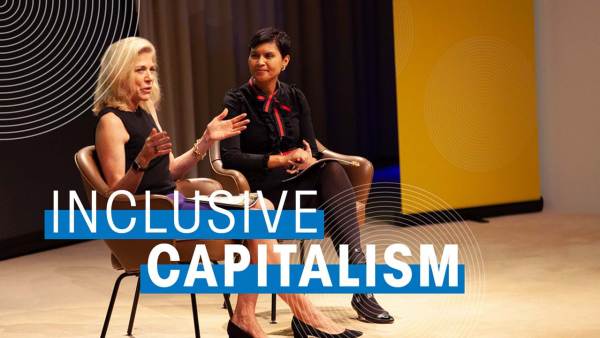
Can capitalism ever really be inclusive? featuring Lynn Forester de Rothschild and Stephanie Mehta
The top 1 percent of the United States controls 42 percent of the national wealth. Lynn Forester de Rothschild, founder of the Center for Inclusive Capitalism, explains that reimagining the economy and making it a sustainable, inclusive system that leads to strong economic growth requires reform.
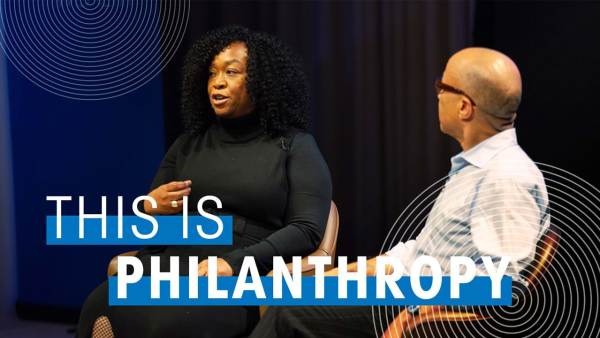
This is what a philanthropist looks like featuring Shonda Rhimes and Darren Walker
Writer and producer Shonda Rhimes has seen the power storytelling has to make change through her work, which centers marginalized people and issues. Rhimes believes philanthropy sets an example others can follow, and says supporting organizations that are already on the ground doing the work is key.
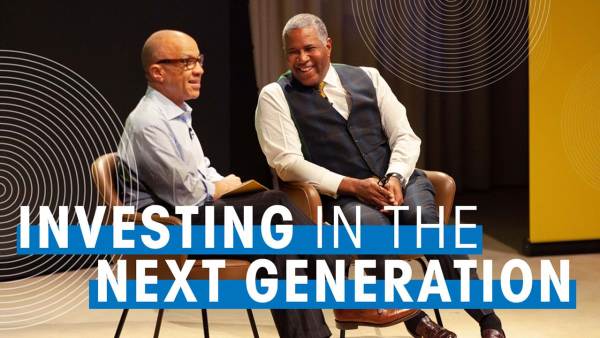
Catalyzing the potential of our time featuring Robert Smith and Darren Walker
Through philanthropy, Robert Smith, CEO of Vista Equity Partners, has alleviated the burden of student debt for a graduating class. He says private philanthropy can help address public policy challenges, such as student loan debt, and is a disruptive opportunity that liberates people to contribute to society in positive ways.
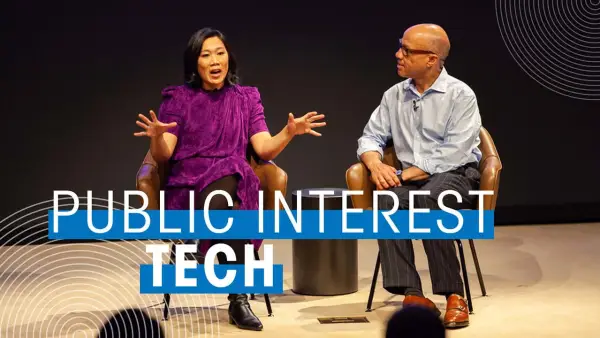
Tech funders changing philanthropy featuring Priscilla Chan & Darren Walker
The top 1 percent of the United States controls 42 percent of the national wealth. Lynn Forester de Rothschild, founder of the Center for Inclusive Capitalism, explains that reimagining the economy and making it a sustainable, inclusive system that leads to strong economic growth requires reform.
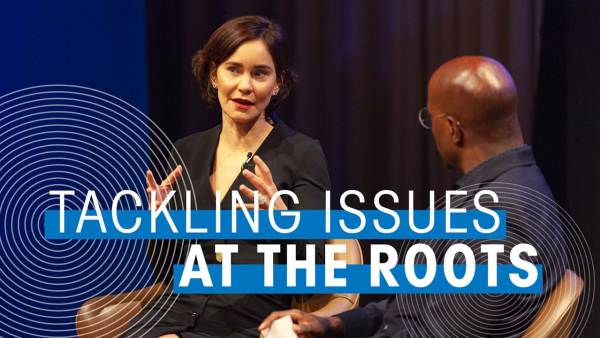
Good philanthropy needs government featuring Laura Arnold and Van Jones
Laura Arnold, co-chair of Arnold Ventures, believes policy change is the lever that will lead to sustainable change. She says we need to attack the systems that are creating the injustices we see, like criminal justice. Philanthropy can create better alternatives that governments can adopt.
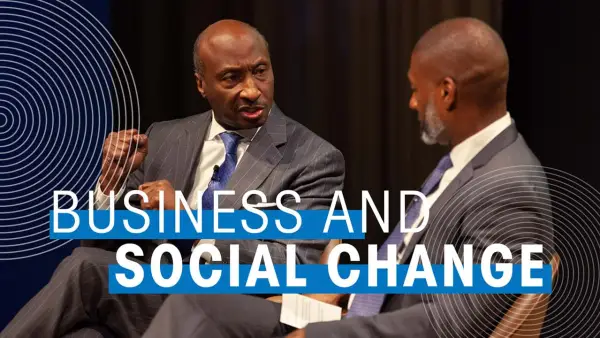
The business of justice featuring Kenneth Frazier and Charles Blow
Kenneth Frazier, CEO of Merck and Co, believes one of the greatest injustices in our society is the health disparities experienced by women of color. A zip code is more likely to determine health outcomes than genetic code. Frazier uses philanthropy to address mortality rate and wants to see more medical personnel listen to their women patients and patients of color.
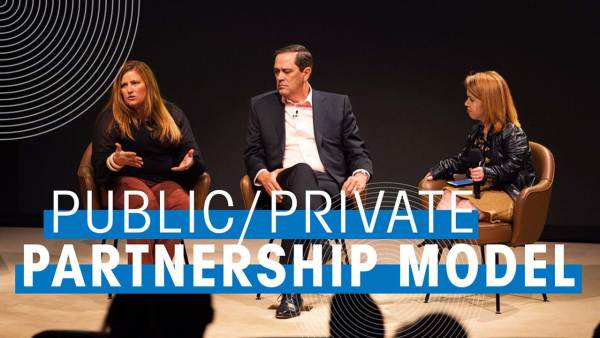
Public-private partnership: A new model for lasting impact featuring Jennifer Loving and Chuck Robbins
Jennifer Loving, CEO of Destination: Home, says a public-private partnership, like the one between her nonprofit and Cisco, headed by Chuck Robbins, can help create a model for the future of philanthropy, and tools like social bonds can help address some of the biggest crises of our time.
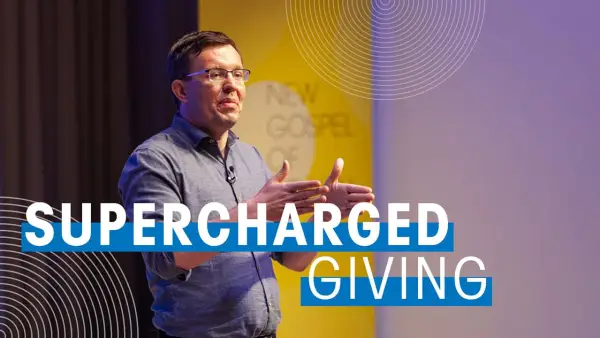
The new power of philanthropy featuring Henry Timms
CEO of Lincoln Center Henry Timms asks how philanthropy can supercharge civic engagement. Timms, who started Giving Tuesday, says trust-based philanthropy needs to shift from generosity to justice, driving more participation from more people, and encouraging meaningful ways to participate and collaborate.
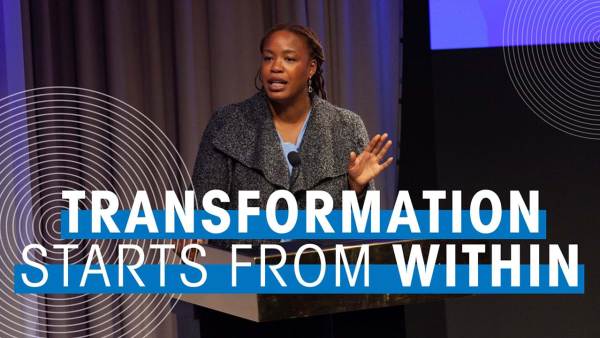
Transforming organizations from the inside featuring Heather McGhee
Heather McGhee, distinguished senior fellow at Demos, shares her experience of working to make the Demos think tank more diverse and led by people of color. Institutional racism, however slight, drives inequality, she says, so transformation needs to be a must-have and not a nice-to-have.
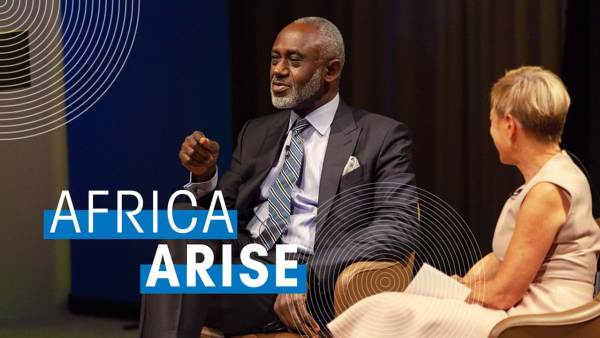
Africa, your time is now featuring Gbenga Oyebode and Hilary Pennington
Ford Foundation trustee Gbenga Oyebode has seen the value of impact investing on the African continent. He believes philanthropy should not just be giving, but investing with a social impact and an economic return. Giving is inherently part of African culture, but needs to be more strategic and collaborative.
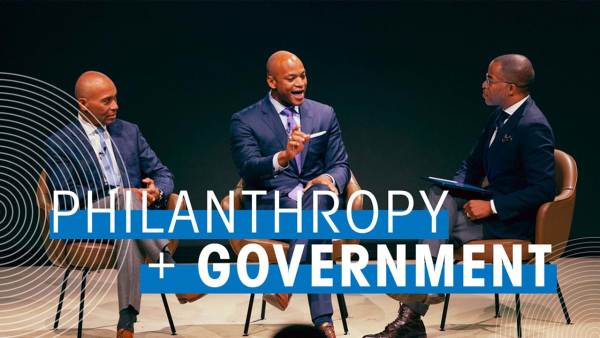
Why good government needs philanthropy featuring Deval Patrick and Wes Moore with Jonathan Capehart
Wes Moore, CEO of Robin Hood, and Deval Patrick, managing director of Bain Capital, see philanthropy working hand-in-hand with government in the fight for equality. Philanthropy can often provide the initial capital needed while government can take over and scale the solution.
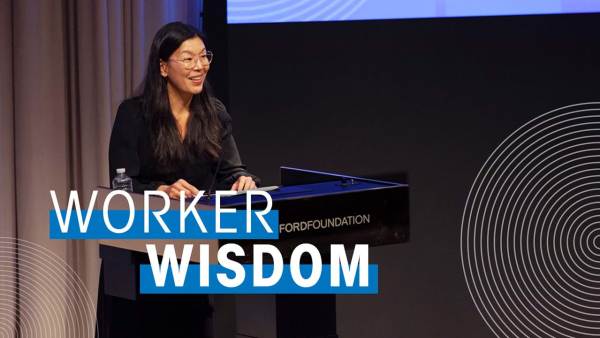
Bringing hidden labor to light featuring Ai-Jen Poo
Ai-jen Poo, executive director of the National Domestic Workers Alliance, says the sector of caregivers and domestic workers continues to grow. Building a future of work that works for all is centered on justice-based philanthropy and not a generosity model.
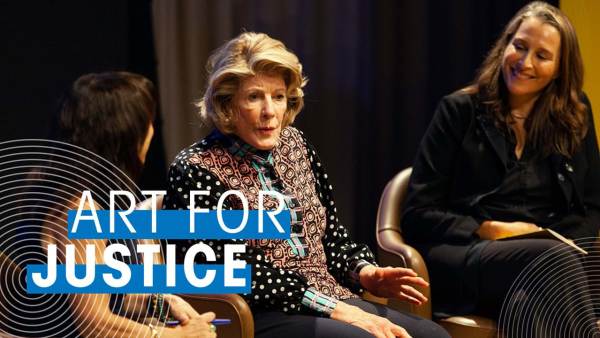
Art for Justice featuring Agnes Gund and Catherine Gund with Maria Hinojosa
The Art for Justice fund was created to help end mass incarceration. Founder Agnes Gund says philanthropy is about addressing issues like this. Catherine Gund believes art has an important part to play in the fight for racial justice and can help change the policies that led to mass incarceration.
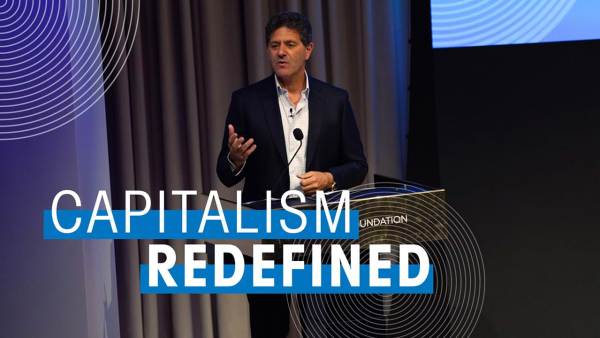
Capitalism redefined featuring Nick Hanauer
Entrepreneur Nick Hanauer asks us to reimagine the economy. He believes we need to change our beliefs about the economy to create a more just, more equitable society for all. By choosing better economic beliefs, we can change society for good.
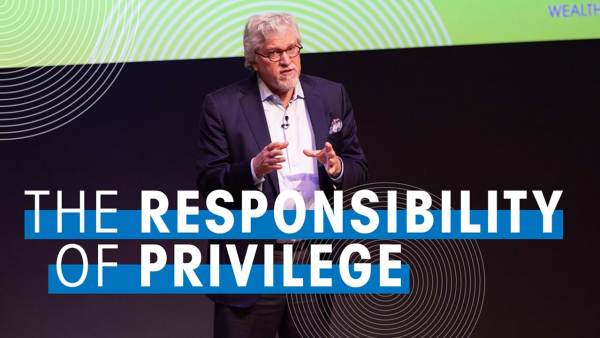
On using power and privilege for change featuring Jeff Raikes
Jeff Raikes, co-founder of the Raikes Foundation, says dismantling racism requires philanthropy to ditch its colorblind approach. People in power need to acknowledge that privilege is invisible to those who possess it. Privilege and power need to be transformed into a force for changing our society for the better.